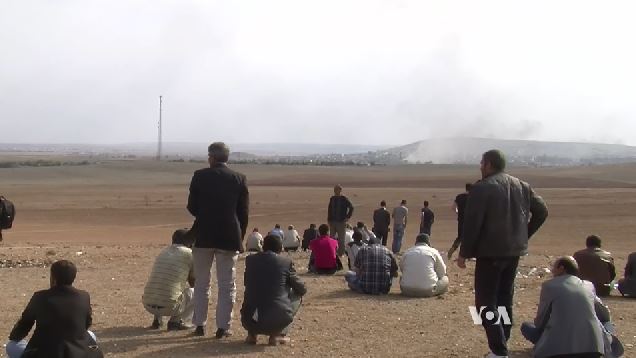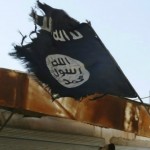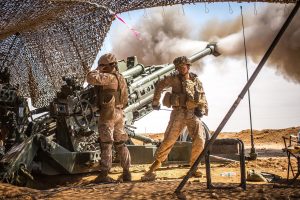by Wayne White
Defenders of the Syrian Kurdish city of Kobani (or Ayn al-Arab) have fought valiantly against heavily armed Islamic State (IS) forces for three weeks with only light arms. Until late on Oct. 7, Washington did relatively little but watch a major contingent of the only effective “boots on the ground” against IS being driven slowly back into their city. Turkey has done less than nothing, triggering domestic protests. Meanwhile, stumbling, less determined Iraqi Army units recently lost key territory to IS despite intense American air support.
The leftist anti-Turkish politics of the Syrian Democratic Union Party (PYD or YPD), its connection to the terrorist Kurdistan Workers Party (PKK), and an iffy Syrian Kurdish alliance of convenience with the Syrian regime against IS may have trumped military wisdom, leaving potentially 2 million Syrian Kurds to bear the full fury of IS mostly alone. Perhaps Ankara expressed early on a preference that Kobani’s defenders receive little US air support, hoping IS might degrade a longstanding thorn in Turkey’s side.
If Turkish President Recep Tayyip Erdogan harbored such sentiments, time has not been kind to him. The international media dramatized the heroic Kurdish stand at Kobani, and Turkey’s large Kurdish population—not just Syrian Kurdish refugees—have become increasingly outraged. Yet although armed with new legislation authorizing him to take military action, Erdogan has remained passive—not even responding to IS artillery and mortar rounds falling inside Turkey (and wounding several Turkish civilians). He also made the mistake of saying publicly on Oct. 7 that airstrikes would not save Kobani, which was “about to fall.”
It’s therefore no surprise that angry Kurdish demonstrators have taken to the streets in cities across Turkey, with authorities responding with tear gas, water cannon, and baton beatings. Eighteen protesters had been killed by Oct. 8. Denying Kobani assistance (such as blocking Turkish Kurds from as far away as Istanbul from joining the fight) threatens to undermine longstanding Turkish efforts to address the Kurdish issue at home and abroad in a conciliatory manner. Indeed, the Turkish-PKK peace process advanced by Erdogan personally could be in real jeopardy.
Shallow Excuses
Meanwhile, in response to increasing domestic criticism over relative US inaction concerning Kobani’s plight, the Pentagon provided questionable excuses for its failure to assist Kobani.
CNN reported on Oct. 6 that, according to US defense officials, air support was largely withheld from Kobani because guided munitions might stray into Turkey, and that the US mission in Syria did not include providing such support. On Oct. 7, a Pentagon source said since IS fighters have entered Kobani, they are difficult to target, and that supporting the fighters in Kobani was inconsistent with what was claimed to be an “Iraq first” policy.
In fact, the advanced guided munitions in use now are quite capable of hitting targets with an error margin measured in yards, not many hundreds of yards—or even kilometers—from the Turkish border. This also suggests that the US mission in Syria to “degrade and destroy” the Islamic State is so tactically rigid that ignoring IS tanks, artillery, heavy mortars, dug-in combatants, and sizeable groups of fighters in the open around Kobani has been acceptable.
Moreover, arguing now that hitting IS fighters besieging Kobani is difficult because they are in the city only begs the question as to why those many vehicles, weapons and IS fighters were not attacked when they were fully exposed. For much of the battle for Kobani, whether or not an Iraq strategy was the priority, there was perhaps no situation in Iraq either so desperate or target-rich as the Kobani sector. And the US did show considerable flexibility in its “Iraq first” strategy to divert massive aerial firepower to strike IS oil refineries, headquarters, and barracks concentrated in Syria.
One senior US official has told the New York Times that there is “growing angst about Turkey dragging its feet…to prevent a massacre less than a mile from its border.” It is no surprise that Gen. John Allen, Washington’s point man for the anti-IS coalition, is going to be in Ankara later this week, and Secretary of State John Kerry telephoned Turkish Prime Minister Ahmet Davutoglu on Oct. 6th and 7th.
With mounting pressure on Washington, US air strikes did begin hitting IS assets to great effect close to Kobani during the night of Oct. 6-7. Previous sporadic American airstrikes had found it difficult to hit IS much at all around Kobani (striking abandoned positions, for example). Suddenly, however—even with IS not only far closer to, but inside Kobani—US airstrikes have scored direct hits, despite prior Pentagon excuses. Twenty IS positions have been hit since Monday, and strikes reportedly have forced IS fighters back to the edge of Kobani.
Calling all “Boots on the Ground”
It will hopefully dawn on American policymakers that assigning little priority to aiding forces facing off gamely against IS around Kobani might enable the group to sweep from the field the only indigenous force now seemingly capable of putting up truly determined resistance against the Islamic State. While the Iraqi Army, Iraqi Kurdish Peshmerga, and the Free Syrian Army whine about not having enough heavy weapons, typically advancing only behind a curtain of US airpower, and even then—around and west of Baghdad of late—still losing vital terrain, YPG fighters stood their ground with what little they had.
In a large battlefield spanning two countries and otherwise bereft of tough anti-IS cadres, allowing Syria’s Kurds to go under could very well be viewed in retrospect as the worst military blunder of this particular US air campaign.
Moreover, sweeping IS lunges into Syrian Kurdistan could set the stage for this brutal group’s most gruesome bloodbath. This would be the Islamic State’s first conquest of a non-Arab, largely secular population. Already committing widespread atrocities in Sunni Arab areas, there is no telling what could happen in Syrian Kurdistan, but Sinjar might provide a foretaste.
*Wayne White served as a peacekeeper in the Sinai with the Egyptian & Israeli armies, and authored hundreds of pieces of military analysis plus major sections of it for National Intelligence Estimates during 1979-2005.






In the absent of true leaders, comes ugly mean men, Bibi, Gutless Obama, chicken Erdogan…….
The situation certainly reminds one of how Joseph Stalin “assisted” the Warsaw Uprising in 1944. As the Russian armies were pushing the Nazis westward, the Polish resistance loyal to the London Government in exile staged an uprising to free Warsaw prior to the arrival of the Russians. After first encouraging the Poles to rise, the Russians sat on the east bank of the Vistula River (in Warsaw) and waited for two months while the Germans crushed the rebellion. Thus the Germans took care of a “pesky” element they would have to get rid of themselves.
We know Erdogan hates the PKK fighters in Kobani. There are photos of massed Turkish tanks just inside the Turkish border. ISIS has finally breached the defenses after a three week siege. but the Turks sit and wait … for what? For ISIS to wipe out this pocket of PKK? How convenient.
As the saying goes, there’s something rotten here and it’s not the Gorgonzola. Turkey is a member of NATO? Just how many different groups are supposedly leading the charge here? The sad part is the burden the innocent civilian population[s] have to suffer because all these so-called leaders calling the shots, don’t have the guts to do the job given them.
ISIS is a US Zionist project, over which they have “temporarily” lost control.
The US bombings of ISIS forces serve as a reminder that they are accountable to the Zionists.
For the Turks, ISIS are also useful in subduing Kurdish nationalism.
Additionally, ISIS are serving the long-term goal of restoring the Ottoman Empire.
Once ISIS have served their purpose, all involved will wipe them out.
Until then, ISIS have a relatively free hand to carry on as they are.
Not until the Assad regime has fallen will ISIS be fully curbed.
But the question is can world opinion wait long enough for Assad to fall?
Erdogan is trapped in his own obsession about Bashar al Assad. Let the Syrian Kurds dies, let ISIS take over Kobani and other areas of Syria, what counts for him is to topple Bashar al Assad.
For three years he has been trying all indirect ways, insulting, threatening, supporting the Syrian opposition political circus, funding Al Nusra, then finally boosting ISIS but never involvin the Turkish army.
All his attempts failed. He now has to feed millions of Syrian refugees, the syrian opposition is a ghost, Al Nusra and all his proxy fighters are now the target of the USA and he is pressured to do a DIRECT intervention to save his enemy, the PKK. A camoaign that may cost Turkey’s economy more money and that may boost the Turkish army that Erdogan is always suspicious about
No wonder he is stubbornly hanging on his last card: Blackmail the USA to force it to help toppling Bashar al Assad militarily.
I doubt the USA will take seriously this infantile manipulation. In my view, it will make Turkey pay a high price for having humiliated Biden and having prevented the use of the US base in Turkey as well as having put conditions to its intervention that are strictly personal.
The day it will be attacked, the USA will put its own conditions to allow NATO to defend Turkey.
Erdogan has fallen in his own trap and his reputation is tarnished for along time,